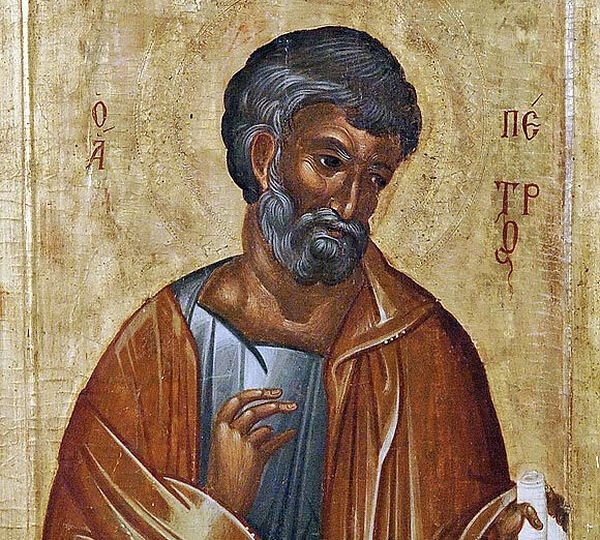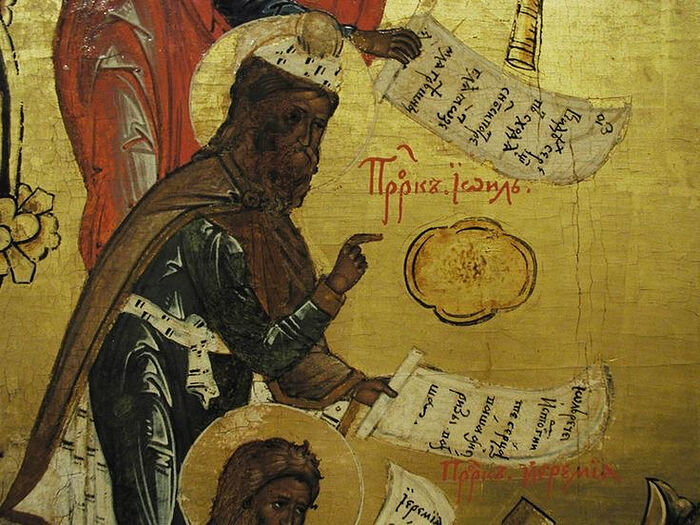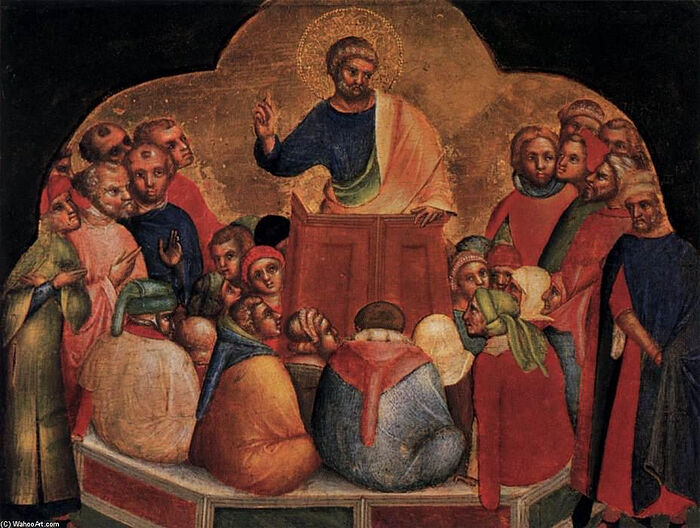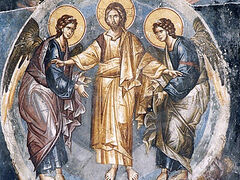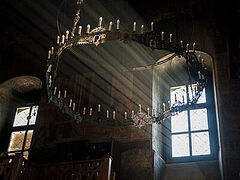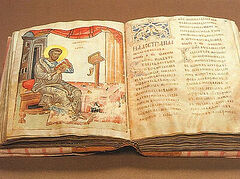We continue our talks on the Book of Acts with Sergei Komarov, a well-known catechist based in Moscow.
2:13 Others mocking said, These men are full of new wine.
The Apostle Peter denies this reproach, because it was the “third hour of the day.” That’s nine in the morning for us. It was an early feast day morning, and neither eating nor drinking was permitted before the feast.
2:14 But Peter, standing up with the eleven, lifted up his voice, and said unto them, Ye men of Judaea, and all ye that dwell at Jerusalem, be this known unto you, and hearken to my words:
Peter is the leader of the community, the mouth of the community. On behalf of the Twelve, he begins to preach.
This is the first sermon in the book of Acts and the first sermon in the history of the Church. There are many sermons in the book of Acts, which makes it very valuable for us. It’s unlikely that they were recorded—they simply memorized the general meaning and then wrote them down.
Ye men of Judaea—a solemn appeal.
2:15 For these are not drunken, as ye suppose, seeing it is but the third hour of the day.
2:16 But this is that which was spoken by the prophet Joel;
2:17 And it shall come to pass in the last days, saith God, I will pour out of My Spirit upon all flesh: and your sons and your daughters shall prophesy, and your young men shall see visions, and your old men shall dream dreams:
2:18 And on My servants and on My handmaidens I will pour out in those days of My Spirit; and they shall prophesy:
2:19 And I will shew wonders in heaven above, and signs in the earth beneath; blood, and fire, and vapour of smoke:
2:20 The sun shall be turned into darkness, and the moon into blood, before the great and notable day of the Lord come:
2:21 And it shall come to pass, that whosoever shall call on the name of the Lord shall be saved.
This is a sermon for the Jews. We have complex Old Testament images before us, following one after another.
The Prophet Joel is a minor prophet. We have four great prophets and twelve minor ones. The word “prophet” in Hebrew literally means “speaker,” that is, one who utters something from God.
Sometimes we misunderstand the words “prophet” and “prophecies.” We think that prophecies are about the future, but that’s not necessarily true. Biblical prophecies are both about the future and about the past, that is, they clarify the meaning of the past or the present. The prophets spoke, tying time into a knot, including the past, present, and future. That is, they spoke the will of God about the past, present, and future. In the Christian sense, a prophet is someone who speaks correctly about God.
Prophets in the Bible are called “naviʾ (speaker),” and “ḥoze” and “roʾe,” both of which mean “seer.”
In the literal sense, the book of the Prophet Joel speaks about an invasion of harmful insects: palmerworms, locusts, cankerworms, and caterpillars. The Prophet writes about the invasion of these insects and calls the Israelites to repentance. We can surmise that the insects are images of the arms that will conquer Jerusalem if the Israelites don’t repent.
After a colorful description of the locust invasion, the Prophet foretells the coming of the Day of the Lord. The Day of the Lord is a technical term. It’s the coming of God into the world. The Jews believed that at the end of the history of the earth, God would come into the world to judge it and exalt the Jewish nation. This coming of God, in fact a kind of judgment, will be accompanied by various cataclysms: wars, earthquakes, solar eclipses. These images are included in the book of Revelation in abundance, and we relate them to the end of the world, because for us, the Day of the Lord is the Second Coming. Only, the Jews awaited this day with fear, but we still await the coming of our beloved Christ, and with us this fear should be dissolved by a bright hope in the Lord, a Christian hope. We should have a different experience of the Parousia.
We don’t know when the Day of the Lord will be, but we know what kind of events will take place on the threshold of the Second Coming. In the book of Revelation, we’re given some models of spiritual events that will take place at the end of time so the Church might understand that these times have come.
Joel speaks of the coming of the Day of the Lord and the outpouring of the Holy Spirit. In the prophecies of Joel, God Himself interprets what happens on the day of Pentecost. The prophecy of Joel is a prophecy of Pentecost.
The final days of history are coming, that is, the Day of the Lord. The Day of Judgment draws nigh. But the last times already arrived with the first days of the existence of the Church. The last times are the time of the life of the Church, in the Biblical understanding. We’re in the last times—that is, there won’t be a new, third Testament. Now is the last times, the New Testament, but no one knows how long it will last.
It’s interesting that the Apostle Peter changes the first words of the prophecy of Joel from: And it shall come to pass afterward (Joel 2:28) to And it shall come to pass in the last days (Acts 2:17). This is apostolic boldness—to edit a prophecy. The Apostles often recite Old Testament lines from memory, approximately. When a man is in the Spirit, he doesn’t deal in literalism. Most important is to speak in the correct context and with the correct meaning.
And it shall come to pass in the last days—this is an expression that for the Prophets refers to the end of the Old Testament times and the beginning of the New. By replacing the indefinite expression afterward with this insertion, the Apostle shows that the time of the fulfillment of the prophecy refers not to the Old Testament, but to the New, that is, to the present moment. St. Peter means that the fulfillment of Joel’s prophecy begins now, and will be carried out throughout the life of the Church. And your sons and your daughters shall prophesy, and your young men shall see visions (Acts 2:17)—these are images of the activity of the Holy Spirit in the faithful.
In short, this is the essence of Joel’s prophecy: On the fiftieth day after the Resurrection of Christ, God the Father gives the Church the Holy Spirit, Who will work wonders, signs, and speak through prophecies, dreams, and visions. The last days that St. Peter speaks of will conclude with the Day of the Lord—the coming of Christ. And further, St. Peter leads the Jews to the thought that the Day of the Lord is the Day of Christ, that He is the Lord—Christ. He’s the One Who is to come.
In the book of Joel, the prophecy of the outpouring of the Holy Spirit upon the Apostles is combined with the prophecy of the future judgment over sinners. We have said that the Day of the Lord is the Day of Judgment. Joel as if ties time up in a knot: He speaks of the coming judgment over sinners and the salvation of those who believe in God. The beginning and end of Church history are connected. This is a common example of a multi-layered prophetic utterance.
Christ spoke in a similar way, answering two questions at once. On the Mount of Olives, when they asked Him about the destruction of Jerusalem and the time of His coming. Christ speaks of the fall of Jerusalem and the end of the world simultaneously (Mt. 24).
Blood, and fire, and vapour of smoke: The sun shall be turned into darkness, and the moon into blood—according to Joel, these are signs of the coming the Day of the Lord—Judgment Day. We have before us the Biblical images of bloodshed, agitations, wars, some particular disasters. When it talks about a sign in the heavens, it’s very similar to the state of nature during the sacrifice of Christ. This was partly accomplished on the day of Christ’s suffering, and it will be fully carried out on the day of His Second Coming.
All of these horrors in the figurative language of Sacred Scripture mean all the troubles that will come to sinful mankind in the end of time. St. Peter makes it clear that the time of God’s salvation for Israel has already begun. The last days have begun, and the Day of Judgment is drawing nigh, the Holy Spirit has already been poured out, and now there will be another time. On the one hand, terrible disasters are approaching, but on the other hand, the New Testament is the era of the outpouring of the Holy Spirit. The elders will prophesy, youths will dream dreams, and so on—these are images of the New Testament communion in the Holy Spirit.
Note that the Apostle Peter interrupts the quotation from Joel, comments on it, and then returns to a later fragment. This is a typical example of an instructive Jewish interpretation known as a “midrash.” This is how the Jewish scribes interpreted Scripture. Some midrashes were recorded and have survived to our day.
2:21 And it shall come to pass, that whosoever shall call on the name of the Lord shall be saved.
The Jews had a very developed teaching about the names of God. They saw there are many names for God in Holy Scripture. They debated about which name is the most important, the most powerful. It was very important for them what name God has. For example, Moses asked God His name. It’s important because the name God comes with indicates His action in the world.
2:22 Ye men of Israel, hear these words; Jesus of Nazareth…
St. Peter means the name of Jesus Christ, which he immediately names. The name of God has great power. In the name of God are found the energies of God. In the ancient Hebrew text, the name of the Lord is the sacred name of God, Yahweh. The Jews, we know, were forbidden to pronounce the name of God. It’s considered to be pronounced in vain, even during the reading of Scripture. Therefore, they use the substitute “Adonai.”
St. Peter most likely used this replacement word too, but then he pronounces the name of Jesus—the name by which all should be saved. Whoever believes in Christ follows His Divine teaching, and the prophecy of Joel is fulfilled in him.
St. Peter says that what the Prophet Joel foretold is being fulfilled through the name of Him Whom he’s about to name—and he names the name of Jesus Christ. The purpose of St. Peter’s speech is to show through the words of the Prophet that God’s promises are eternal, and to give an interpretation of what has just occurred.
“Since the goal and end of all the aspirations, desires, and hopes of Old Testament man was the Messianic times, and therefore the appearance of the Messiah in the world was for him the coming of the end of the world, the beginning of the ‘last days,’ that’s why in the prophetic contemplation of Joel, the events of the First and Second Coming of Christ to Earth, distant in time, but similar according to essence, unite and merge,” writes Professor D. P. Bogolepov.

